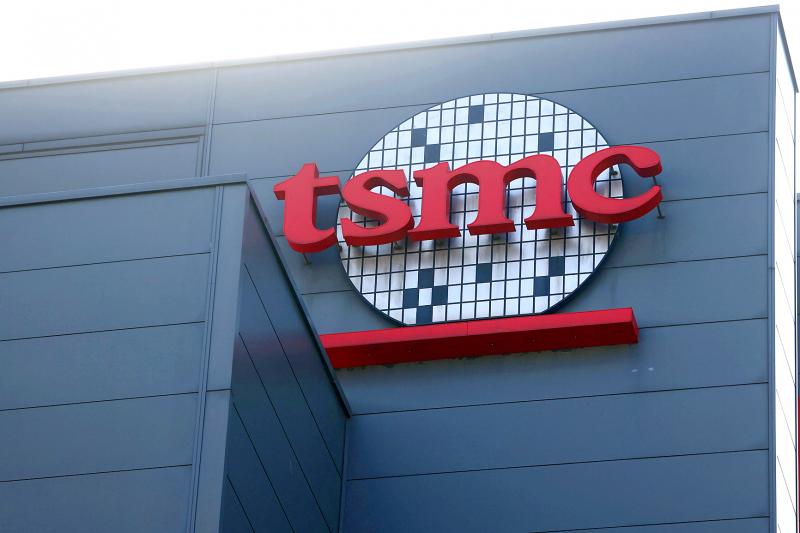Taiwan Semiconductor Manufacturing Co’s (TSMC, 台積電) board of directors has approved a plan to invest up to ¥18.6 billion (US$177.7 million) to set up a fully owned subsidiary in Japan to expand its 3D semiconductor material research, the company said yesterday.
The subsidiary is to begin operations this year, company spokeswoman Nina Kao (高孟華) said.
The announcement comes amid escalating geographic tensions worldwide, and highlighted TSMC’s strategic importance in global supply chains.

Photo: Ann Wang, Reuters
The Japanese government has reportedly been coaxing TSMC, the world’s largest contract chipmaker, to build a factory in Japan.
Japan-based clients contributed about 5 percent to TSMC’s NT$1.34 trillion (US$47.2 billion) revenue last year, company data showed.
The Nikkei Shimbun on Monday reported that TSMC is planning to invest about ¥20 billion to set up a research and development facility in Ibaraki Prefecture, while also looking at establishing a new company in Japan.
The new facility would focus on advanced semiconductor packaging and testing, the report said, adding that TSMC is considering installing a production line in Japan.
TSMC did not comment on the Nikkei report.
The board yesterday approved capital appropriation of US$11.79 billion for next quarter, which would be used mainly for factory construction, and installing and upgrading advanced technology capacity, as well as research and development, TSMC said.
To finance its capacity expansion and related expenditures on pollution prevention, the board approved a plan to issue local unsecured corporate bonds of up to NT$120 billion, and to act as a guarantor to its subsidiary TSMC Global Ltd’s issuance of US dollar-denominated senior unsecured corporate bonds of up to US$4.5 billion, it said.
The board also approved a proposal to distribute a cash dividend of NT$2.5 per share. That represents about a 45 percent payout ratio based on earnings per share of NT$5.51 during the quarter ending on Dec. 31.
It also approved the payment of performance-based bonuses and profit-sharing rewards of approximately NT$69.51 billion to employees for last year’s work.
Earlier yesterday, TSMC said that its revenue expanded 22.2 percent to NT$126.75 billion last month, compared with NT$103.68 billion a year earlier.
Last month’s revenue was the highest level since September last year.
On a monthly basis, revenue rose 8 percent from NT$117.37 billion.

MAKING WAVES: China’s maritime militia could become a nontraditional threat in war, clogging up shipping lanes to prevent US or Japanese intervention, a report said About 1,900 Chinese ships flying flags of convenience and fishing vessels that participated in China’s military exercises around Taiwan last month and in January have been listed for monitoring, Coast Guard Administration (CGA) Deputy Director-General Hsieh Ching-chin (謝慶欽) said yesterday. Following amendments to the Commercial Port Act (商港法) and the Law of Ships (船舶法) last month, the CGA can designate possible berthing areas or deny ports of call for vessels suspected of loitering around areas where undersea cables can be accessed, Oceans Affairs Council Minister Kuan Bi-ling (管碧玲) said. The list of suspected ships, originally 300, had risen to about 1,900 as

Japan’s strategic alliance with the US would collapse if Tokyo were to turn away from a conflict in Taiwan, Japanese Prime Minister Sanae Takaichi said yesterday, but distanced herself from previous comments that suggested a possible military response in such an event. Takaichi expressed her latest views on a nationally broadcast TV program late on Monday, where an opposition party leader criticized her for igniting tensions with China with the earlier remarks. Ties between Japan and China have sunk to the worst level in years after Takaichi said in November that a hypothetical Chinese attack on Taiwan could bring about a Japanese

Right-wing political scientist Laura Fernandez on Sunday won Costa Rica’s presidential election by a landslide, after promising to crack down on rising violence linked to the cocaine trade. Fernandez’s nearest rival, economist Alvaro Ramos, conceded defeat as results showed the ruling party far exceeding the threshold of 40 percent needed to avoid a runoff. With 94 percent of polling stations counted, the political heir of outgoing Costa Rican President Rodrigo Chaves had captured 48.3 percent of the vote compared with Ramos’ 33.4 percent, the Supreme Electoral Tribunal said. As soon as the first results were announced, members of Fernandez’s Sovereign People’s Party

MORE RESPONSIBILITY: Draftees would be expected to fight alongside professional soldiers, likely requiring the transformation of some training brigades into combat units The armed forces are to start incorporating new conscripts into combined arms brigades this year to enhance combat readiness, the Executive Yuan’s latest policy report said. The new policy would affect Taiwanese men entering the military for their compulsory service, which was extended to one year under reforms by then-president Tsai Ing-wen (蔡英文) in 2022. The conscripts would be trained to operate machine guns, uncrewed aerial vehicles, anti-tank guided missile launchers and Stinger air defense systems, the report said, adding that the basic training would be lengthened to eight weeks. After basic training, conscripts would be sorted into infantry battalions that would take